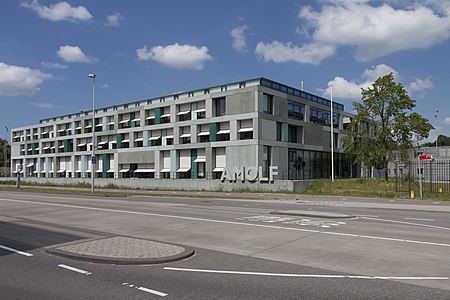AMOLF
Nanotechnology institutionsOrganisations based in AmsterdamPhysics institutesResearch institutes in the Netherlands

Research institute AMOLF is part of the institutes organization of Netherlands Organisation for Scientific Research (NWO). AMOLF carries out fundamental research on the physics and design principles of natural and man-made complex matter. AMOLF uses these insights to create novel functional materials and find new solutions to societal challenges in renewable energy, green ICT and healthcare. AMOLF is located at the Amsterdam Science Park.AMOLF used to be part of the Dutch Foundation for Fundamental Research on Matter (FOM). On 31 December 2016 FOM integrated in NWO.
Excerpt from the Wikipedia article AMOLF (License: CC BY-SA 3.0, Authors, Images).AMOLF
Kruislaan, Amsterdam Oost
Geographical coordinates (GPS) Address Website Nearby Places Show on map
Geographical coordinates (GPS)
| Latitude | Longitude |
|---|---|
| N 52.355277777778 ° | E 4.9519444444444 ° |
Address
Science Park Amsterdam
Kruislaan
1098 XH Amsterdam, Oost
North Holland, Netherlands
Open on Google Maps






